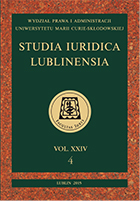
We kindly inform you that, as long as the subject affiliation of our 300.000+ articles is in progress, you might get unsufficient or no results on your third level or second level search. In this case, please broaden your search criteria.

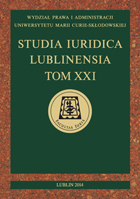
The article discusses deception as the modus operandi of the perpetrator of rape. First, the Polish criminal law approach to rape by deception is discussed. The author presents the commonly accepted ways of understanding the term “deception” as it is used in Art. 197 § 1 of the Polish penal code. Then some interpretation discrepancies are discussed, e.g. the problem of contracting a false marriage in order to obtain the victim’s consent to sexual intercourse. Next, British and American criminal law approaches to the problem of rape by deception are presented. The author stresses the most prominent differences in understanding rape by deception in those legal systems, coming to the conclusion that they are partly due to the fact that the victim’s lack of consent (or valid consent) is seen as the main component of the crime of rape, while in the Polish penal code the lack of consent is not directly expressed and is only presumed in the process of interpreting the statutory features of the crime of rape.
More...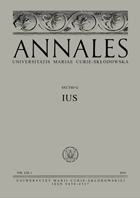
"Particular cruelty" is a feature that constructs qualified (with severer punishment) type of rape. There has been established quite a good general line of interpreting "particular cruelty", although in specific. cases it is not applied in a proper way. There is a tendency to use general leads of The Highest Court in a automatic. and objective way, without relating them into the circumstances of the case; especially without taking under one's consideration some specifics of the victim. The empirical research was made on 29 files of cases that had been finished in 20062012, with the act classified as fulfilled the article 197 § 4 of Polish Criminal Code.
More...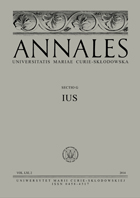
The institution of self-defence comprises both provisions of the General Part (art. 36 and 37: self defence and imaginary self defence) and the Special Part (art. 118 and 124: intentional killing, causing grievous bodily harm as a result of exceeding the borders of self defence or using excessive measures necessary to catch the perpetrator) of the Criminal Code of Ukraine. There are diverse opinions in Ukrainian jurisprudence concerning the problem of how self-defence and other circumstances eliminate the illegality of a forbidden act. The aim of this paper is to present the main attitudes to these problems. The approach considering self-defence in the light of legality is the most popular view. There is also an approach according to which one distinguishes the prerequisites for self-defence and the elements of such self-defence taking into account elements such as: the subject – the aim – the objective side – the subjective control. The socially harmful attack which justifies the use of self-defence should be analysed using both of these approaches. The features of a legitimate self-defence are: the subject – a private person; the aim – to cause injuries to the attacker (the direct aim) in order to repel or stop the attack (the indirect aim) in order to defend legally protected rights and interests of a person, interests of the society or the state (the final aim); the object – the attacker, his rights and interests; the objective side – actions casually connected with the causing of harm to the attacker, commensurable with the harmfulness of the attack and the state of the defence; subjective control – proper realisation by the subject of the prerequisites and features of the defence and the will to cause commensurable harm to the attacker. Two types of exceeding the borders of self-defence are distinguished in the paper: exceeding the borders of acceptable harm and exceeding the borders of adequate harm. Criminal responsibility for exceeding the borders of self-defence arises only in cases clearly provided for in art. 118 and 124 of the Criminal Code of Ukraine. The sanctions in these articles are much more lenient than in the case of corresponding offences not committed while exceeding of the borders of self-defence (art. 115, 119 and 121 of the Criminal Code of Ukraine).
More...
The article presents the basic theoretical and practical problems referring to self-defence as a circumstance excluding illegality of an act in Polish criminal law. The features of self-defence have been presented against the background of the general theory of circumstances excluding illegality, of which self-defence is one of the most notable instances, as well as the interpretation problems connected with it. The basic conditions of self-defence have been discussed, such as: the attack, the repelling of it, the necessity of the defence and its compatibility with the danger of the attack. The issue of the independence of self-defence has been referred to in detail. Separate remarks have been devoted to the features of the attack which has to be illegal, direct and real, as well as to the problem of exceeding the borders of self-defence, including intensive excess and extensive excess, the exceeding of the borders of self-defence as a result of fear or nervousness justified by the circumstances of the attack and the institution of the so called intervention self-defence which is new for the Polish legal system. The issue of the acts of a person who mistakenly believes that a circumstance excluding their illegality occurs has also been mentioned. Up-to-date literature and the court rulings have been extensively used.
More...
U okviru Redakcije “Gračaničkog glasnika” duže vremena sazrijevala je ideja da se otvori i pokrene pitanje evidencije svih izginulih i nestalih Bošnjaka tokom Drugog svjetskog rata kao pitanje koje se do sada manje-više zaobilazilo u našoj domaćoj historiografiji. Razlozi su, uglavnom, poznati i oni su zajednički za čitav prostor bivše države. Još 1998. godine, kao urednik “Gračaničkog glasnika”, potpisnik ovih redova je na njegovim stranicama (u broju 6 od 1998.) otvorio neke dileme o sudbini Bosne i Bošnjaka u Drugom svjetskom ratu, a neposredan povod za to bilo je pitanje jesu li partizani, zapravo, okupirali ili oslobodili naše gradove u završnici Drugog svjetskog rata, koje se politiziralo do banalnosti i izazvalo nove podjele među Bošnjacima. U istom broju, na molbu Redakcije, u raspravu se uključio prof. dr. Omer Ibrahimagić, tada sudija Ustavnog suda Federacije BiH i profesor Fakulteta političkih nauka u Sarajevu. Iz svog ugla, on je u istom broju elaborirao pitanje “Jesu li Bošnjaci u Drugom svjetskom ratu bili na pravoj strani” i predložio Redakciji da odgovor na njega zatraži od još desetak najistaknutijih Bošnjaka u oblasti politike, historiografije i prava s prostora Bosne i Hercegovine. Tu sjajnu ideju i nadasve korisnu inicijativu Redakcija, nažalost, iz objektivnih razloga nije mogla “iznijeti”.
More...
Ana Batrićević - Jovan Ćirić „Tužioci i žrtve“, Institut za uporedno pravo, Beograd, 2009.
More...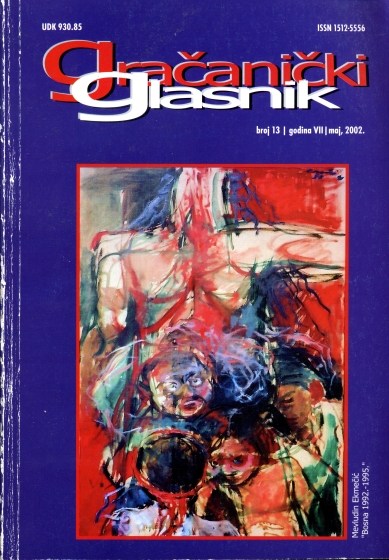
Iako je proslo punih 10 godina od pocetka rata za Bosnu i Hercegovinu, Gracanica jos uvijek nije dobila svoju "knjigu mrtvih". Ne ulazeci u uzroke takvog stanja, "Gracanicki glasnik", evo, po prvi put objavljuje cjelovite spiskove poginulih branitelja, pripadnika Armije Republike Bosne i Hercegovine i spiskove ubijenih civila na podrucju opcine Gracanica. Bez obzira sto smo ulozili velike napore da bismo kompletirali ove spiskove, svjesni smo cinjenice da oni nisu potpuni, mada su najpotpuniji do sada napravljeni. Stoga vas molimo za razumijevanje zbog eventualnih nedostataka ovog priloga.
More...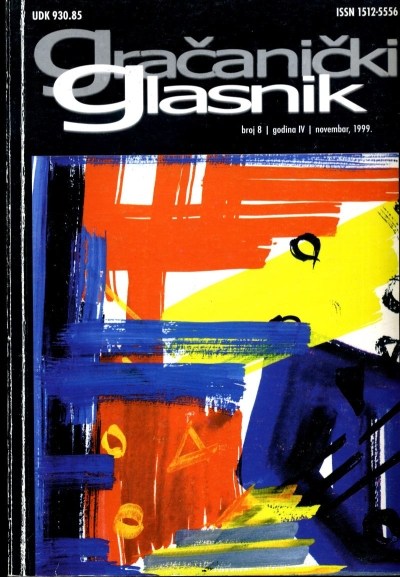
Agresija na Bosnu i Hercegovinu dugo će predstavljati pravi izazov za proučavanje i poučavanje, posebno kada su u pitanju uzroci i posljedice agresije, njen karakter i njen tok kao i uslovi pod kojima je izvedena u vremenu “ubijanja Bosne” od 1992. do 1995. godine. Indirektne, pak, posljedice jos dugo ce se manifestovati na pravnom, državnom, ekonomskom i populacionom planu ove zemlje.
More...
Although traditionally it was believed that this is the problem of Middle East and South Asia regions, the danger and threat of suicide terrorism have been spreading all over the world. It is very difficult for the international community to find the way out from the “blind alley” it has been wondering about for such a long time crucified between the recognition that this type of terrorists’ acts has acquired the form of epidemic and the reactions which, frankly, do not yield any (or very bad) results, therefore falling into depression and frustration due to accumulating challenges, not able (and not ready) to face them in an adequate manner. Although they claim that they launched the resolute campaign against this form of terrorism, it is obvious that the suicide terrorists have survived it. The range of potential targets has widened, the number of casualties increased, the imagination in designing the methods of the execution of these operations multiplied, but the strategies and tactics for prevention and fighting against this huge problem do not appear to represent an obstacle for further progressing of this dramatic phenomenon. On the contrary, it seems as if the world “rewards its rebellious children”.
More...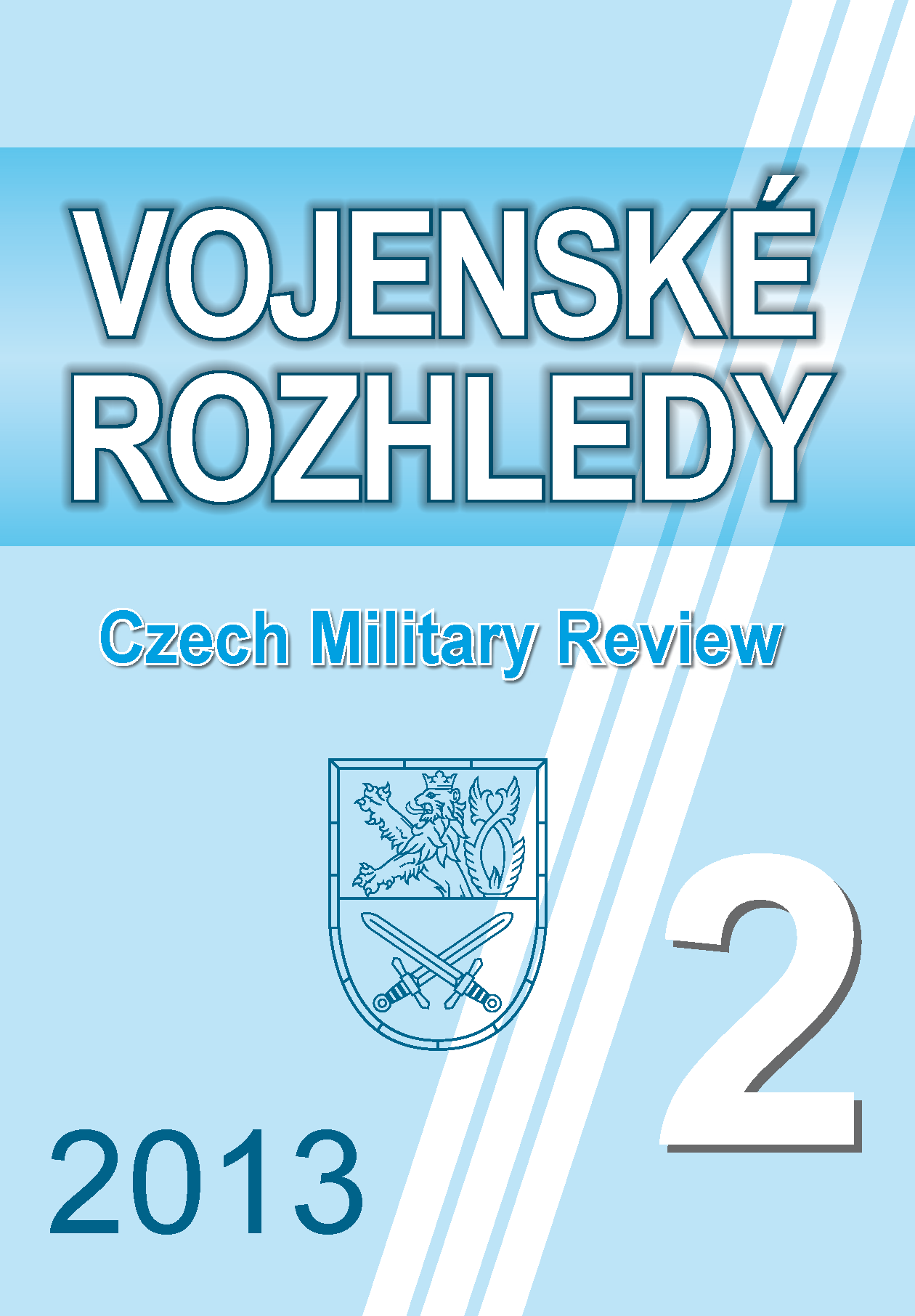
The purpose of this paper is to define cyberterrorism phenomenon with the use of available documents, reports, and expert texts, and to evaluate its role and occurrence in contemporary world's events. The cyberterrorism is very often discussed nowadays, but there is a total lack of any consensus as far as a precision definition is concerned. The critique of current state is summarized at the end of the final chapter, describing leading causes of present situation, i.e. a situation when the cyberterrorism is discussed, politicised, all repeatedly underline its dangerousness, but in practice no cyber attract has occurred.
More...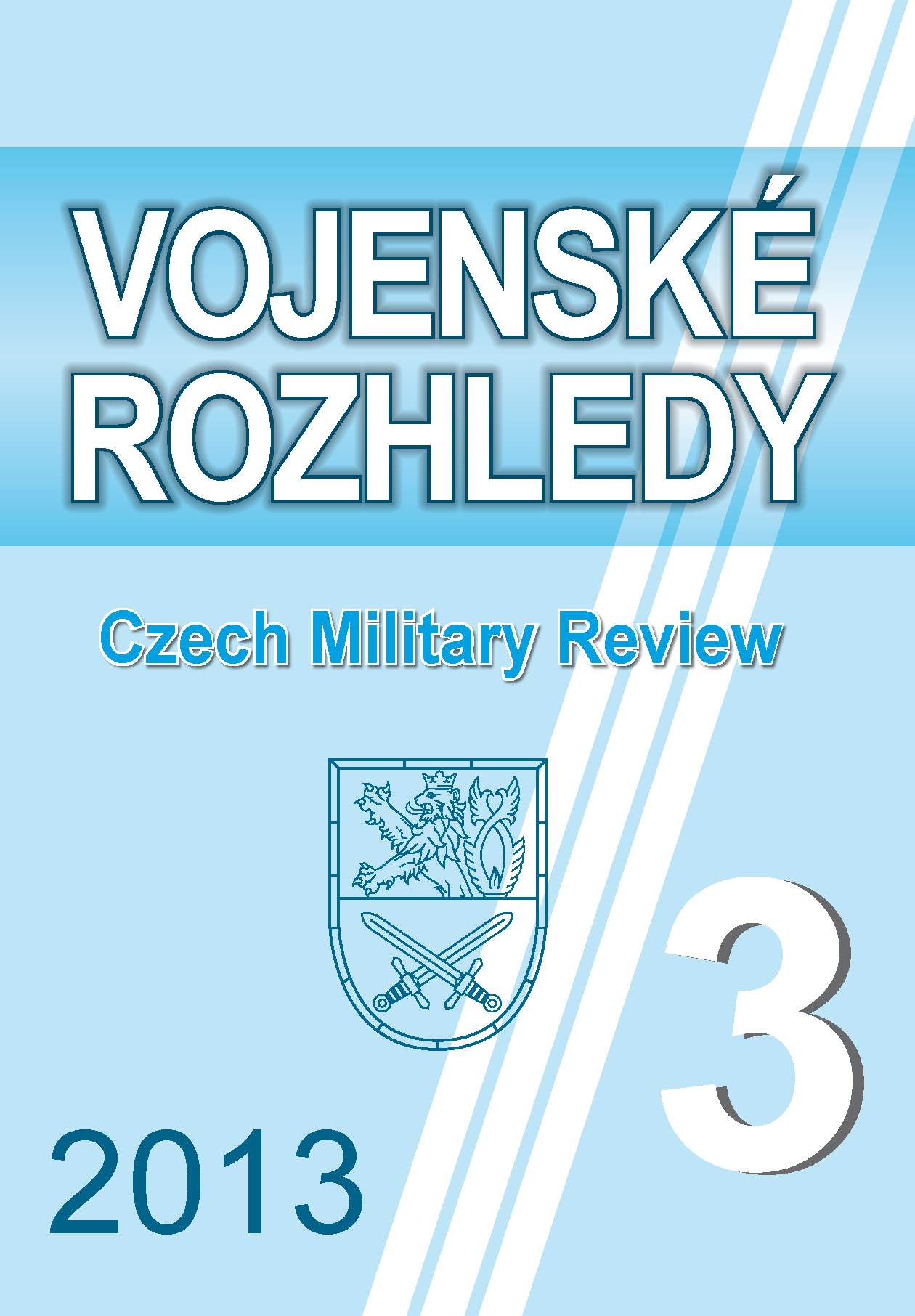
This study deals with the responses to recent Syrian conflict in the Czech Republic. The authors introduce particularly activities inside Syrian diaspora, actually formed during the time of communism. Syrians citizens living in the Czech Republic are not homogeneous, which is similar to the situation in Syria. In our country we can find both people loyal to the regime of Ba'ath Party and Bashar al-Assad, and also members of opposition that in fact has divided into two groups, since the mid-2012. The authors introduce reactions of various subjects from the Czech Republic.
More...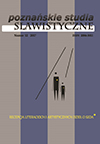
Putyńska Urszula, Odegrać przeszłość. Szkic o powieści Götz i Meyer Davida Albahariego (Reenacting the Past. An Essay on Götz and Meyer by David Albahari). “Poznańskie Studia Slawistyczne” 12. Poznań 2017. Publishing House of the Poznań Society for the Advancement of the Arts and Sciences, pp. 271–282. ISSN 2084-3011. This paper is the analysis of Götz and Meyer (Gec i Majer, 1998) by David Albahari (b. 1948), the writer of Serbian and Jewish origin. His novel belongs to the Holocaust-literature and its metanarrative structure calls into question the problem of transferring radical historic moment into fiction. The article focuses on the interrelations between fiction and fact, imagination and history, as well as the traumatic experience recognized as the opportunity to identify with the experience of Holocaust victims. Albahariʼs novel proves that remembering of dramatic events from the past can be activated both by imagination and traumatic experience.
More...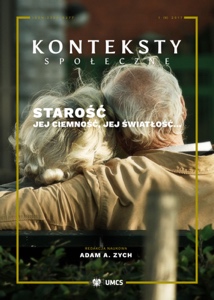
The article presents a comprehensive system of prevention of violence against the elderly people, which includes four integrally connected areas: education, mass media, the state and the law. The fifth component is science (research, diagnosis, surveys, concepts, paradigms and theories) which can be a kind of a staple binding together the items of prophylaxis mentioned above. The knight-errant syndrome is also discussed, when sincere intentions to help can turn against the harmed person. Therefore, while seeking preventive action to eliminate violence against the elderly from family and/or public life, one should be aware of the aforementioned syndrome so as not to worsen the situation of the victims of violence.
More...
The review of: “Osoby starsze jako ofiary przemocy domowej. Ujęcie wiktymologiczne. Wyd. 2. poprawione./Older people as victims of domestic violence. The victimological view. Second edition – corrected” by Jolanta Maćkowicz; Oficyna Wydawnicza „Impuls”. Kraków 2017, s. 358
More...
Violence against women is a phenomenon we encounter on a daily basis and which is present in all areasand all cultures and social systems, through time. The most severe form of violence against women is femicide, as a gender-based murder of a woman by a man who thinks he has a right to take her life. Femicide is therefore a crime that discriminates. Since this phenomenon is still rarely object of scientific research, the author of this article wants to give contribution to the further study and recognition of femicide as an urgent social problem, his understanding and adequate response through the legal systems of the countries. The author puts focus of discussion in this paper, on the issue of femicide, starting with the analisys of the phenomenon of violence against women, meaning of this notion, its forms, and the International, European and national legal framework. While in conclusion, author explicates confirmation of hypotheses that there is an inadequate legal framework for the prevention of femicide, as a serious social problem in international, European and national legal framework, both directly through the criminalization and punishment of the perpetrator of this crime, as well as taking other measures aimed at prevention and protection of women against this form of violence.
More...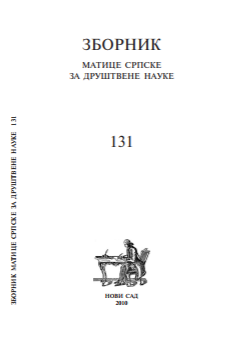
With approximately 20 suicides per 100.000 inhabitants, Serbia is placed in the upper half of all European countries based on the suicide rate. There are differences between Central Serbia and Vojvodina, which are more pronounced than the existing differences in overall mortality. Although these differences are becoming smaller, they are still present and related to the age structue and ethnic composition of the population, as well as religious affiliation and sociocultural factors present in these two regions. According to data for 2008, the suicide rate in Vojvodina was 23,4 per 100.000. The paper focuses on the analysis of data on mortality due to suicide of two vulnerable age groups, youth aged 15—24 and the elderly over 65 years of age, in the last four decades (1966—2008). In the youth group, differences by age and sex are observed, with a focus on prevention, while in the elderly group there was also a focus on differences in marital status, ethnicity and education.
More...
The NATO intervention in the former Yugoslavia was accomplished 10 years ago and has caused a great number of civilian victims. Until now they have not succeeded in getting any relief, neither at international nor at municipal judicial level. Victims of armed conflicts were barred from getting any redress for wrongdoing due to the traditional concept of state immunity and the concept of non-justiciability of individual claims against States arising from events taken place in an armed conflict. The damage compensation proceedings conducted before national tribunals of state perpetrators ended in the de facto denial of justice and impunity. However, State perpetrators can be held responsible within the framework of international and applicable municipal law in the following way: Firstly, the tribunals in Serbia are the most convenient forum for the settlement of disputes arising out of torts committed with respect to war activities in Serbia.
More...
There were circumstances under which it was permissible to kill another human being in the ancient Athenian democracy. Moreover, the killing itself was governed by a number of statutes. As citations to, and exegesis of, the applicable statutes had a role of means of evidence in the Athenian litigation; the speeches of the Attic orators contained numerous citations of individual statutes. As a result, some of these statutes survived until today as fractions of the preserved oratorical pieces – such as the Speech against Eratosthenes, coming under a name of Lysias.
More...
The purpose of the article is to trace the development of the victims vs. perpetrators discourse as an integral part of the historical master narrative of Latvia since the end of the 19th century till nowadays. The narrative of abuse plays an essential role in historical master narratives of many modern national communities, as their integrity is strongly dependent on defining themselves via binary oppositions. According to Anthony Smith, in this self-identification process of a nation culture, mass communication and education play a particular role [Smith, 1991]. Maurice Halbwachs has specified that school textbooks, media and cultural production actually do not care much about the 'real history' - what is being implemented, refers to 'collective memory', adapted to the requirements of the actual presence [Halbwachs 1980]. The research paper analyses how this collective memory pattern has been shaped throughout time in the historical master narrative of Latvia as reflected in literature, media and school textbooks. The research focuses on the 'official' master narrative, as the research objective was to reveal how the past has been adjusted to present under changes of political regimes and social developments. However, in the context of the second half of the 20th century contrasting voices have been included in order to suggest the presence of the multiplicity of narratives and to pose a series of questions to the current cultural and socio-political interpretation of the past of Latvia.
More...